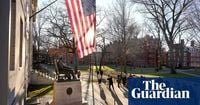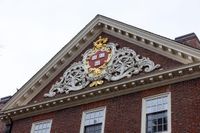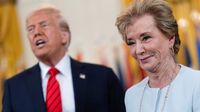Harvard University is standing firm against demands from the Trump administration to modify its policies, risking $9 billion in federal grants. This decision, made public on April 14, 2025, marks a significant moment in the ongoing conflict between elite academic institutions and the federal government over issues of free speech, academic independence, and alleged antisemitism.
In a statement to the Harvard community, President Alan M. Garber articulated the university's position, emphasizing that it would not yield to what he described as a politically motivated pressure campaign. "The university will not surrender its independence or relinquish its constitutional rights," Garber asserted. This declaration comes in response to a list of demands issued by the Trump administration, which included controversial measures such as eliminating diversity, equity, and inclusion programs, banning masks that conceal protesters’ identities, and implementing stricter admissions criteria for international students.
The administration's demands were laid out in a letter sent on April 11, 2025, by the Department of Education, the Department of Health and Human Services, and the General Services Administration. The letter accused Harvard of failing to meet the intellectual and civil rights conditions necessary to justify federal investment, a claim that has sparked significant debate.
Garber's response highlights the university's commitment to free speech and academic integrity. He stated that the government’s approach "makes clear that the intention is not to work with us to address antisemitism in a cooperative and constructive manner." Instead, he contended that the majority of the demands represented direct governmental regulation of the university's intellectual environment.
Harvard's resistance is particularly noteworthy given its substantial financial resources. With an endowment exceeding $52 billion, the university is in a strong position to oppose federal pressures, a fact underscored by former Harvard President Larry Summers, who remarked, "If Harvard can’t resist, who can?" This financial cushion allows the institution to prioritize its principles over potential funding losses.
The Trump administration's stance has drawn criticism from various quarters. While some Jewish advocacy groups view these demands as necessary to combat antisemitism on campus, others argue that the government is misusing the issue to impose broader restrictions on academic freedom. Harvard's lawyers have echoed this sentiment, stating that the demands "invade university freedoms" long recognized by the Supreme Court.
In contrast to Harvard's stance, Columbia University has opted to comply with similar demands from the administration, reportedly to avoid losing $400 million in federal funding. This decision has led to criticism that Columbia capitulated too quickly to government pressure, undermining its commitment to academic freedom and free speech.
The situation at Harvard reflects a broader national trend where elite universities are facing scrutiny over their handling of diversity initiatives and allegations of antisemitism. The Trump administration has threatened to review federal funding for several Ivy League institutions, including Princeton, Brown, and Cornell, as part of its campaign against what it perceives as a left-leaning bias in higher education.
Additionally, the administration's demands have included a call for reforms to the admissions process for international students, aiming to screen for those "supportive of terrorism and anti-Semitism" and to report any violations of university conduct policies to federal authorities. This approach raises significant concerns about academic independence and the potential chilling effects on free expression within university settings.
Harvard's refusal to comply with the administration's demands could have serious financial ramifications. The review of $9 billion in federal grants and contracts, including funding for Harvard's research hospitals, poses a substantial risk to the institution. However, Garber's message to the university community reflects a commitment to uphold the university's values, stating, "It threatens our values as a private institution devoted to the pursuit, production, and dissemination of knowledge."
The ongoing conflict between the Trump administration and Harvard is emblematic of a larger struggle within American society over the boundaries of free speech, academic independence, and the role of government in regulating higher education. As universities grapple with these challenges, the outcomes of such disputes will likely shape the future landscape of academic freedom in the United States.
In a related legal development, a federal judge in Louisiana recently ruled that Columbia University graduate student Mahmoud Khalil could be deported despite having been granted legal permanent residence in the U.S. This ruling underscores the administration's aggressive stance on immigration and its implications for students involved in pro-Palestinian activism.
As universities navigate these turbulent waters, the stakes remain high. The decisions made by institutions like Harvard and Columbia will not only impact their own futures but may also set precedents for how academic freedom is defined and protected in the years to come.






